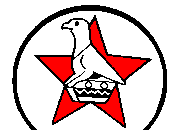ZIMBABWE NETZWERK e.V. |

|
Maseko releasedVictory for Gukurahundi artistSaturday, 18 September 2010 20:32BULAWAYO - Prominent visual artist Owen Maseko who is facing charges of undermining President Robert Mugabe's authority after he mounted an exhibition on the Gukurahundi massacres was a relieved man yesterday when his case was referred to the Supreme Court. A Bulawayo magistrate Ntombizodwa Mazhandu granted Maseko's application that the highest court on the land must determine the constitutionality of charges criminalising his artistic work. In her judgment Mazhandu said: ``It is not a secret that Gukurahundi took place at a certain point in Zimbabwe and it is not in dispute that it took place in Matabeleland. ``Whether it was a certain tribe or race that was affected is not known to the court. ``It can only be determined through leading evidence whether or not the portrayal of that period is purely a work of art or is the material false.'' She said the Supreme Court was also better placed to determine whether or not any of Maseko's rights had been violated. On Thursday the magistrate accompanied by the defence and the prosecution teams visited the National Art Gallery in Bulawayo to view the controversial paintings. This was after the magistrate had pointed out the previous day that she would not be in a position to make a ruling without first seeing the paintings. Maseko's defence lawyers Lizwe Jamela, Nosimilo Chanayiwa and Jeremiah Bamu of the Zimbabwe Lawyers for Human Rights made an application seeking the Supreme Court sitting as a constitutional court to determine whether or not criminalising his artistic work was a violation of his freedom of conscience. They placed special emphasis on freedom of thought enshrined in Section 19 of the constitution, freedom of expression, enshrined in Section 20 of the constitution and the protection at law as outline in Section 18. The state represented by Tawanda Zvekare opposed the application. Zvekare argued that the rights in question were not absolute and were subject to certain exceptions under which they could be waived. He further noted that Maseko's case was an example of the type of circumstances under which the exercise of the rights was restricted. Bamu said the ruling meant that the trial would not continue until the case was finalised by the Supreme Court and also that Maseko had been placed off remand. ``Human rights are not absolute but they should not be restricted to protect governments or anyone for that matter from exposure,'' said Bamu. Maseko was arrested on March 26 after putting up a Gukurahundi exhibition named ``Sibathontisele'' (Dripping blood). He was charged with violating Section 33 of the Criminal Law (Codification and Reform) Act which alludes to insulting or undermining the authority of the president. The charge was then dropped and he was charged under Section 31 of the Criminal Law (Codification and Reform) Act: publication of false statements prejudicial to the state, or alternately undermining the authority of the president. Government last month banned Maseko's art and statue of a naked man titled ``Looking into the future'' mounted outside the Bulawayo gallery saying they fell foul of the country's censorship laws. Maseko's victory in court came a day after a United States-based human rights group said Mugabe and several of his cronies should be charged for crimes against humanity for their role in the Matabeleland and Midlands killings. Genocide Watch, said the military campaign led by the North Korean-trained 5th Brigade, which human rights groups say left 20 000 civilians dead can be classified as a genocide. Mugabe who has referred to the mass murder as ``a moment of madness'' has refused to apologise.
BY ZENZELE NDEBELE
Letzte Änderung: Monday, 20-Sep-2010 21:19:30 CEST
|

